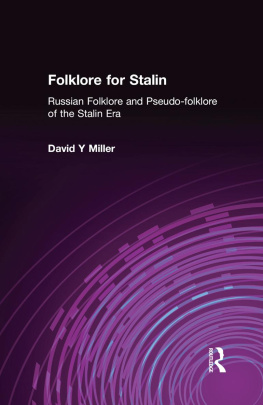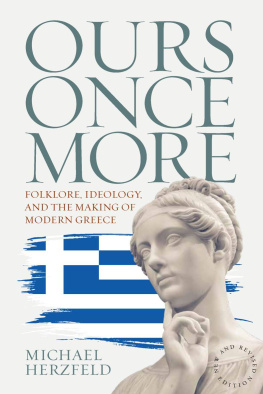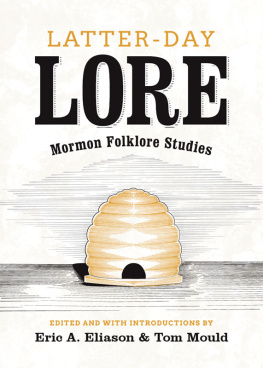This book is a publication of
Indiana University Press
Office of Scholarly Publishing
Herman B Wells Library 350
1320 East 10th Street
Bloomington, Indiana 47405 USA
iupress.indiana.edu
2016 by Dorothy Noyes
All rights reserved
No part of this book may be reproduced or utilized in any form or by any means, electronic or mechanical, including photocopying and recording, or by any information storage and retrieval system, without permission in writing from the publisher. The Association of American University Presses Resolution on Permissions constitutes the only exception to this prohibition.
The paper used in this publication meets the minimum requirements of the American National Standard for Information SciencesPermanence of Paper for Printed Library Materials, ANSI Z39.48-1992.
Manufactured in the United States of America
DOI: 0.2979/humbletheory.0.0.00
Library of Congress Cataloging-in-Publication Data
Names: Noyes, Dorothy, author.
Title: Humble theory : folklores grasp on social life / Dorothy Noyes.
Description: Bloomington : Indiana University Press, 2016. | Includes bibliographical references and index.
Identifiers: LCCN 2016019837 (print) | LCCN 2016032583 (ebook) | ISBN 9780253022912 (cloth : alk. paper) | ISBN 9780253023148 (pbk. : alk. paper) | ISBN 9780253023384 (ebook)
Subjects: LCSH: FolklorePhilosophy. | FolkloreStudy and teaching. | EthnologyPhilosophy. | EthnologyStudy and teaching.
Classification: LCC GR40 .N69 2016 (print) | LCC GR40 (ebook) | DDC 398.2dc23
LC record available at https://lccn.loc.gov/2016019837
1 2 3 4 5 22 21 20 19 18 17
Introduction
Had it not been for the stern advice of more than one friend, I would have relieved my own anxieties by entitling this introduction, Whats Wrong With This Book? Better scholars than I have introduced their work with disclaimers of performance, even or especially since Richard Bauman first called our attention to the practice (Bauman 1977; Jackson 2013a). In a book called Humble Theory, I cannot help feeling that I have much to be humble about. The essays here are likely to satisfy neither ethnographers nor theorists, and assuredly they will not satisfy historians.
But life is short and art is long and fools rush in where angels fear to tread. (At this point in my career I no longer fear clichs: they save time.) By temperament, circumstance, and my sense of a need at this period in the history of folklore studies, I have found myself again and again in the discussants chair: hazarding generalizations, drawing up provisional schemata, trying to connect the dots across a field of fragmented engagements and localized knowledges. These essays record some of my attempts to capture the big picture.
Some scholarly trajectories are the product of will and focus. My more winding path owes everything to serendipity and context. A formative context was of course the Department of Folklore and Folklife at the University of Pennsylvania, from which I obtained my PhD in 1992. As Karl Mannheim long ago observed, intellectuals take direction from the crisis of their generation ([1923] 1952), and my graduate education coincided with the height of the postmodern and postcolonial critiques of the ethnographic disciplines. I remember it as a time of tears and tension at folklore meetings, followed for many years by fragmentation and a sense of paralysis. Everything seemed impossible, both ethically and intellectually. Ethnography was appropriation, comparison was reduction, and theory was playing Goda God of a particularly patriarchal, monotheistic, and Western tendency. All representation was at best distortion.
The critique was necessary, well-grounded, and far more nuanced than my presentation of it here, but in the heat of debate it was often oversimplified and converted from critique to crisis. What then was to be done? Two alternatives were prominent in my academic neighborhood: the literary and the activist escapes from the burden of representation. At first more among anthropologists than folklorists, there was a turn toward fiction and autobiography: the field adventure became an acknowledged voyage of self-discovery, tethered more or less tenuously to the voices of others. I did not feel this option was open to me: my self was of no interest to a larger audience, and if I had had creative talent I would have become a novelist. It must be said that some of the work of the period was self-indulgent; to me, at any rate, it seemed a dead end.
The other, activist line took shape as the profession of public folklore was reconfiguring itself, its business tilting from documentation and celebration toward advocacy, collaboration, and technical assistance. Here my experience was more fruitful, if difficult: in three years of work for the Philadelphia Folklore Project I learned the extent of my navet and sheltered past. With all my admiration for the models then being developed by Bill Westerman and Debora Kodish, among others, I came to understand that I would have to work for years to build the moral courage and social acumen required for this path, while my temperament and existing abilities might serve me better elsewhere. Instead of trying to kill off my inner dead European academic, therefore, I decided to provincialize it, as Chakrabarty proposes (2000): to think hard about what use I might be as a scholar and how I could do more good than harm from my compromised position. At the same time, I set out to consider what might hold together the centrifugal field of folklore studies.
Of course I had any number of examples of useful work before me in the Penn faculty and across the field. I was best able to follow the lead of my dissertation advisor Roger D. Abrahams and my outside reader, James W. Fernandez. One taught me appropriate ambition, the other an enabling humility before the task. With a restless intellect like my own, Roger was always trying out the boundaries of the field, looking at what folklore and other disciplines had to say to one another. He taught me the value of the academic game and the need to play at a higher level; the need, indeed, to play, for he was incomparably fertile in invention, always trying out new formulations for identifying the effects and devices of vernacular performance. Still today, whenever I have an idea that strikes me as particularly clever, I know that within a day or so I will remember it as an aside that Roger let drop one day.
Jim Fernandez put me back at ease with representation. His recognition that we are all inchoate pronouns, struggling to represent ourselves and the world so that action can become possible, taught me to live with the imperfection of our work as well as the imperfection of the human efforts we study. It is all essay, in the etymological sense: a trying-out and trying-on of language always subject to revision or redirection by others. Particularly fruitful for folklorists, and for me as an ethnographer of Spain, was his later work on irony, the most resonant trope in all of the post-fascist, post-socialist, postindustrial, and post-modern worlds we inhabit. I have accepted, and become deeply interested in, the fact that the repertoires most ready to hand are not of our making, carry baggage, and are not going away any time soon.






